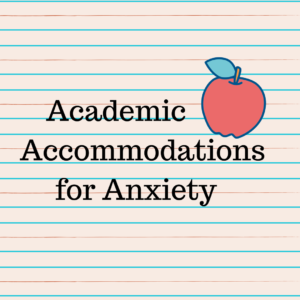
Does your son or daughter have an anxiety disorder? Usually if this is the case, their anxiety may affect their experiences in school. The question then becomes, how can the school and I work together to help my child?
Talk to the Teacher
The first steps most parents take is to talk to their child’s teacher. A teacher is going to see how anxiety is manifest on a daily basis in the school setting. There may be small changes a teacher can make that can help your child adjust better.
Talk to an Administrator
A second step is talking with a school administrator or school psychologist to see what kind of accommodations may be available based on your child’s needs. It may be necessary to do a more formal Individualized Education Plan (IEP) or 504 plan (overview of differences here).
When we’ve worked with schools, it’s valuable to view them as an ally who wants to work with you in helping educate your child. With that in mind, we’ve found it’s better to have a discussion with administrators about how your child is struggling and see what ideas they have based on the school’s resources. Although it’s a good idea to have some ideas about possible accommodations, know that the resources available may depend on the school. If there are specific necessary accommodations, then it is important to formalize the needs in writing through an IEP or 504 plan. If necessary (when needs are clearly not being met) you can resolve disputes through legal action.
The following are some accommodation ideas we’ve seen or recommended, but the list is not comprehensive and it’s not a checklist of things a school must provide. Also, remember that accommodations do not need to be long-lasting or always utilized. They can often be something your child has an option and they can use it if they need it. This still allows your child to feel appropriate levels of discomfort (especially if it’s encouraged by their therapist), but not past the point that it’s too overwhelming.
In-Class Accommodation
- Extra time to complete assignments
- Sensitivity about speaking in class, developing a system for classroom speaking
- Flexibility with bathroom breaks
- Flexibility with being able to go to the front office
- Flexibility with assigned seating (this would make it important to talk to your child’s teacher before the school year begins)
Testing Accommodations
- Extra time on tests
- Testing in a quieter room
- Modified testing as needed
School-based Intervention
- Weekly meetings with the school psychologist or school counselor
- Attending an counseling group with other students
- Accommodations for assemblies (sitting with someone known, sitting near an exit)
